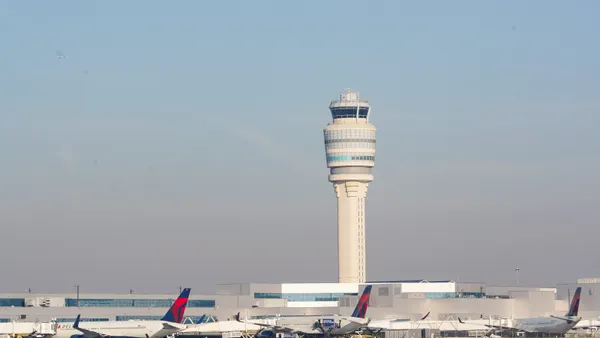UPDATE: President Barack Obama signed the two-week funding measure Friday using an "autopen" while he was in Malaysia. Authorized funding was set to expire Friday night.
UPDATE: The Senate approved the two-week funding stopgap measure from the House on Thursday. The bill now heads to President Obama, who is expected to sign it before the current authorized funding expires today.
Dive Brief:
- The House passed another short-term highway funding extension by voice vote late Monday, this time stretching funding authorization for two more weeks.
- Funds are currently set to expire on Friday, but this latest stopgap measure would keep federal money available through Dec. 4. The bill was sponsored by House Transportation and Infrastructure Committee Chairman Rep. Bill Shuster (R-Pa.).
- The new extension doesn't include authorization for additional spending, as the short-term measure passed in July included enough funding to last through the end of 2015. However, the U.S. Department of Transportation cautioned that it would cease payments for infrastructure projects to local and state governments if lawmakers were unable to reach any kind of settlement — short-term or long-term — by the Friday deadline.
Dive Insight:
After passing the most recent funding extension at the end of October, lawmakers said they hoped to send a multiyear measure to Obama by Thanksgiving. However, this week's move indicates they expect to need more time to settle on a long-term solution. If this most recent measure is passed, it would mark the 36th short-term highway funding extension from Congress.
"The conference committee needs the time necessary to meet in public, complete negotiations, and produce a final measure that helps improve America’s infrastructure," Shuster said of the stopgap measure. "This clean extension provides time for that process to occur and for the House and Senate to vote on the final legislation, without shutting down transportation programs and projects in the meantime."
Both the House and Senate have passed multiyear highway funding bills that include six years of spending policy, but only three years of funding. The chambers are still negotiating a combined version of the two long-term measures.
Although the construction industry has encouraged Congress to pass long-term solutions, industry experts have expressed concern with the lack of full funding for all years of the bills from both chambers.
The constant temporary patches for transportation funding have created a climate of uncertainty in the industry that has negatively affected construction starts, jobs, and even Caterpillar’s sales, according to the heavy equipment giant.













